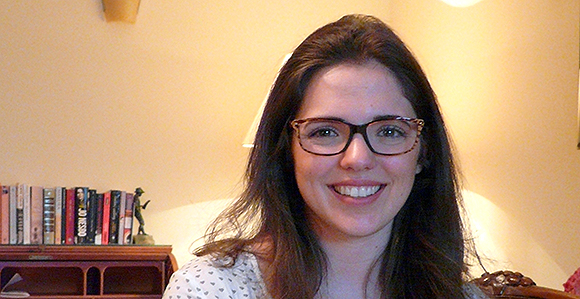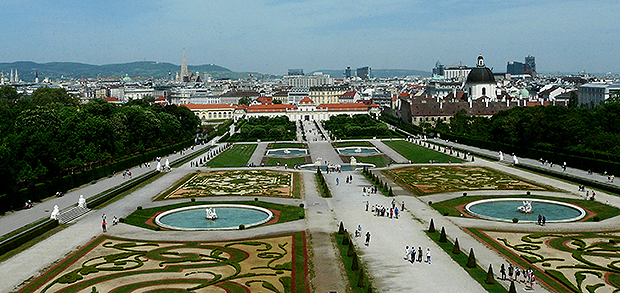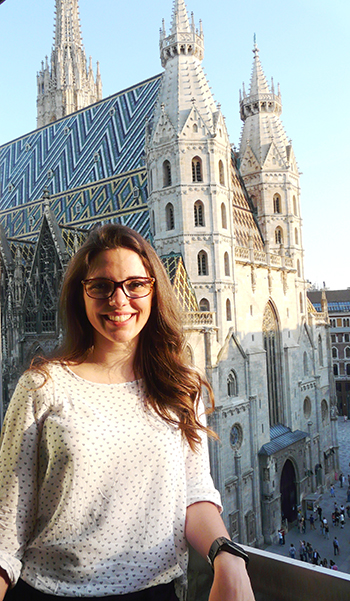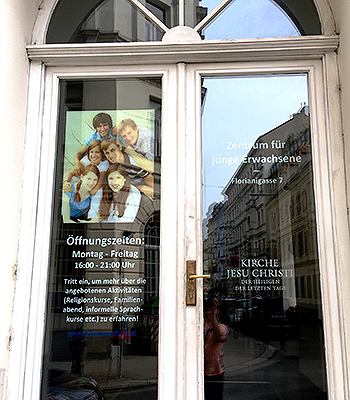How the Gospel Has Shaped the Life of Austrian Medical Student
Contributed By Laurie Williams Sowby, Church News contributor

Esther Wosnjuk Duffles uses her skills in languages, medicine, and leadership to bless lives in Vienna. Photo by Laurie Williams Sowby.
VIENNA, AUSTRIA
Esther Wosnjuk Duffles hails from Alaska, but she says her heart will always be in Austria.
In 2006, Esther left after a year and a half at the University of Utah in Salt Lake City to immerse herself in classes taught entirely in German at the Medical University of Vienna. At 21, she was called from Austria to serve in the Salt Lake Temple Square Mission, July 2007–December 2008, where she used the German she’d picked up in her studies as well as Portuguese, which she learned from her family.
Esther’s facility with both English and German serves her well as the institute director for the Vienna Austria Stake, where she meets weekly with an evening class of around 40 students and also hosts a Thursday morning class for young moms whose children share the room during discussions. The building at Florianigasse 7, near the Rathaus (city hall), was opened as a Young Single Adult Center 10 years ago, and Esther was at its dedication as a young single adult.
Esther’s affinity for Austria was born in her heritage: her grandmother on her mother’s side immigrated to Brazil with her Ukrainian husband as a way to start over after World War II. Eventually, that new beginning allowed this European family living in Brazil to meet and join The Church of Jesus Christ of Latter-day Saints in 1967.

Vienna old and new spreads out beyond the Belvedere Gardens. Photo by Laurie Williams Sowby.
Esther’s mother was born and raised in Brazil, served a mission there, and moved to the United States as a young adult. Esther’s grandfather was of Ukrainian descent, and Esther’s middle name, Wosnjuk, is Ukrainian. Her father, Wilson Duffles, was baptized in Brazil and met Sonia Wosnjuk in Provo, Utah. They’ve made Anchorage, Alaska, their home since 1988.
“I owe a lot of my testimony and my Church exposure to my parents,” Esther said. “I was always aware of my family’s own ‘pioneer’ heritage.”
That included the Portuguese language.

For Esther Wosnjuk Duffles, institute director in the Austria Vienna Stake, 1,000-year-old Stephansdom Cathedral is a symbol of her adopted country. Photo by Laurie Williams Sowby.

The Vienna YSA Center at Florianigasse 7 hosts classes and activities through the week. Photo by Laurie Williams Sowby.
“There was nobody else who spoke Portuguese in Alaska in the late ’80s,” Esther explained. “If I wanted to communicate with my grandparents, my parents saw it as their responsibility to teach my brother and me the language of their fathers. We still speak Portuguese as a family today.”
Austria started to become a part of Esther’s life when at age 12 she began accompanying her grandmother on extended trips home to Austria to visit family. Esther became especially close to her great-aunt Gertrude, staying weeks at a time and absorbing the language and culture. After three summers in Austria, she felt that was where she belonged. Vienna has been her home for nearly 13 years now.
During that time, Esther has been a seminary teacher and Young Women president in her ward and stake. In addition, she’s often called upon to provide live translation for conferences, firesides, and mission presidency trainings.
She believes she was called to serve in the CES institute program “because of my great love for this age group.” She said, “The goal for me is that everybody goes home edified and that all of us leave feeling grateful we were there [at institute].”
She added, “I’m grateful the Church has been visionary with the Savior’s way of teaching—inviting the teachers to be students as well.” She feels responsible to help fledgling testimonies become authentic as people “internalize concepts and share personal stories.”
As a single woman, Esther says of her local Church leaders, “They have never hesitated to support me.” She added, “We as women need to show by example. The Church is going places, and we need to help carry the vision forward.”
In her work, Esther assists with orthopedic surgeries, and to fill her need to be with children, she worked at a pediatric clinic and taught English to kids as a nanny. She’s also rounded out her experience by working as a tour guide.
She chose to do some of her medical rotations in the countries of Georgia and Brazil and was “grateful for the chance I had to see from a medical standpoint how places with fewer resources ‘make do.’”
But as she’s deepened her understanding of the gospel, Esther has found it taking her in a different direction than she first envisioned when she started her medical studies.
“As I was learning the physiologies of organs,” she said, “I was so disenchanted with the world’s view that we get sick to go to a doctor. Considering what I had studied, it made sense to me that a doctor’s role is keep the population healthy, so I’ve chosen to work in public health.”
Esther’s desire is to be in a management position where health policy is discussed and plans are created to optimize health on a macro level, rather than sporting “a white coat and a stethoscope.” With her thesis completed, she’ll soon be applying to global organizations.
“I’d like to go where I’m needed,” she said. “The gospel brought the idea of keeping people healthy to the table,” and that’s the path she intends to pursue. It all leads back to her philosophy, “What can we give each other?”
